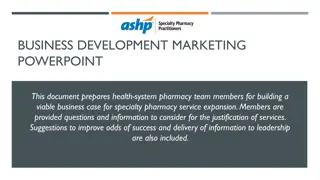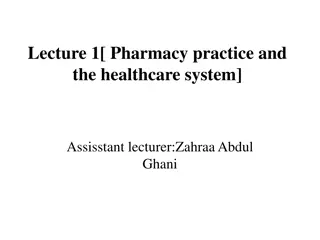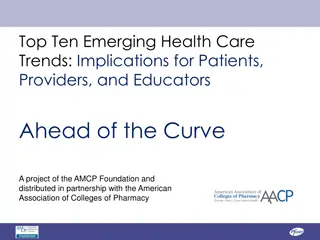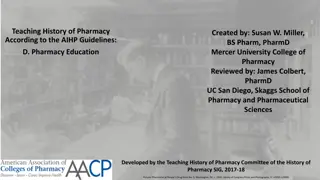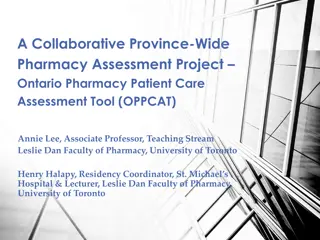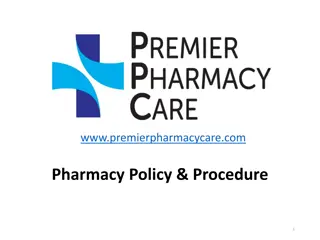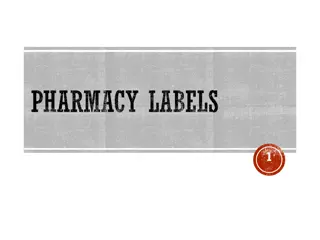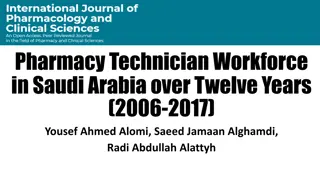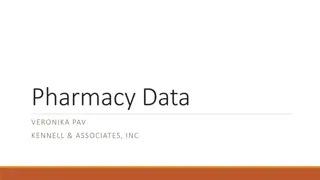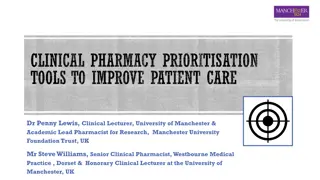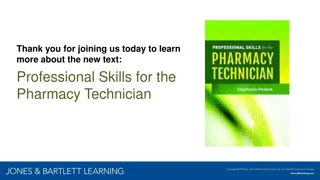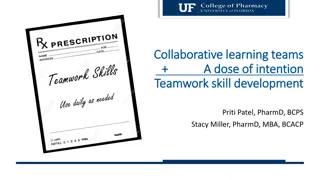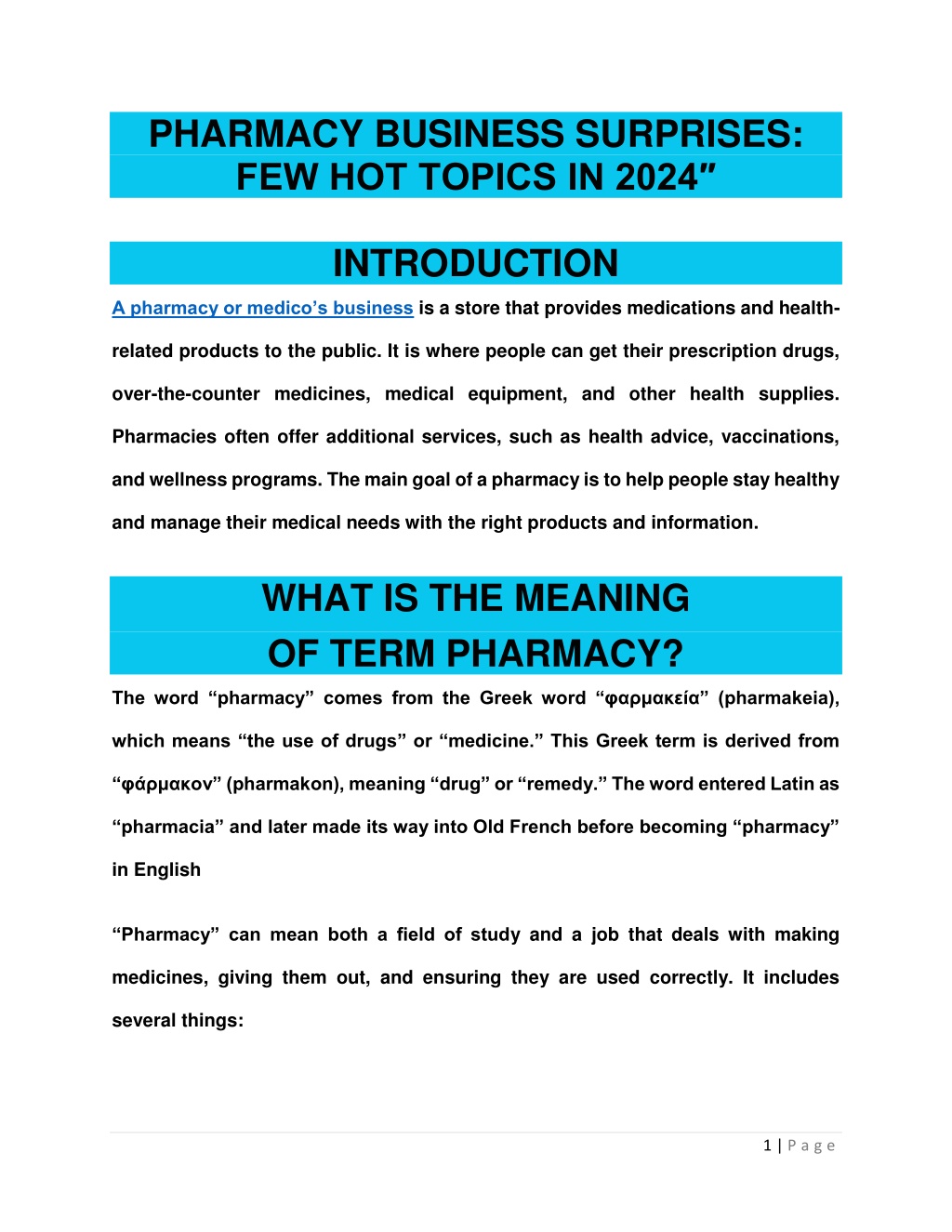
PHARMACY BUSINESS SURPRISES: FEW HOT TOPICS IN 2024
//seribangash.com/nA pharmacy or medicou2019s business is a store that provides medications and health-related products to the public. It is where people can get their prescription drugs, over-the-counter medicines, medical equipment, and other
Download Presentation

Please find below an Image/Link to download the presentation.
The content on the website is provided AS IS for your information and personal use only. It may not be sold, licensed, or shared on other websites without obtaining consent from the author. Download presentation by click this link. If you encounter any issues during the download, it is possible that the publisher has removed the file from their server.
E N D
Presentation Transcript
PHARMACY BUSINESS SURPRISES: FEW HOT TOPICS IN 2024 INTRODUCTION A pharmacy or medico s business is a store that provides medications and health- related products to the public. It is where people can get their prescription drugs, over-the-counter medicines, medical equipment, and other health supplies. Pharmacies often offer additional services, such as health advice, vaccinations, and wellness programs. The main goal of a pharmacy is to help people stay healthy and manage their medical needs with the right products and information. WHAT IS THE MEANING OF TERM PHARMACY? The word pharmacy comes from the Greek word (pharmakeia), which means the use of drugs or medicine. This Greek term is derived from (pharmakon), meaning drug or remedy. The word entered Latin as pharmacia and later made its way into Old French before becoming pharmacy in English Pharmacy can mean both a field of study and a job that deals with making medicines, giving them out, and ensuring they are used correctly. It includes several things: 1 | P a g e
Science: Pharmacy is the field that studies medicines and how they work in the body. This means knowing about drug science, pharmacokinetics (how the body takes in, moves around, breaks down, and gets rid of drugs), and pharmacodynamics (how drugs affect the body). This scientific information helps chemists ensure that medicines are used safely and effectively. As a profession, pharmacy includes giving out medicines, giving information about drugs, and giving advice on how to use medicines safely and effectively. Pharmacists work in a variety of places, such as community pharmacies, hospitals, and research centers. They often work with other healthcare workers to provide better care to patients. Pharmacy as a Place: A pharmacy is also a venue where medicines are stored and given out. Sometimes this is called a drugstore or pharmacist. It can also be a hospital pharmacy or a specialized pharmacy. 2 | P a g e
HISTORY OF PHARAMCY The history of pharmacy is a rich tapestry that reflects the evolution of medicine, science, and technology. Here s a broad overview: Ancient Beginnings: Around 1500 BCE, the first written accounts of pharmacies come from Egypt. During this time, the Ebers Papyrus is an important record that lists many medicinal plants and preparations. The ancient Egyptians used many things, like honey and moldy bread, that were full of drugs. 3 | P a g e
Ancient Greece and Rome: The Greek and Roman cultures made important contributions to the growth of medicine. Hippocrates, who lived from about 460 to 370 BCE and is often called the father of medicine, stressed the value of diet and herbal remedies. In the first century CE, a Greek doctor named Dioscorides wrote a book called De Materia Medica. It was a complete guide to plant medicine that had an impact on both medieval and Renaissance pharmacology. The Middle Ages Islamic Golden Age: From the 8th century to the 14th century, the Islamic Golden Age, scholars like Avicenna (Ibn Sina) made great strides in the field of medicine. The Canon of Medicine by Avicenna had a lot of information about drugs and how to use them. Islamic doctors, who were also called alchemists or pharmacists, were very important in keeping old knowledge alive and adding to it. Europe in the Middle Ages: Monasteries were very important for keeping and expanding medicinal knowledge in Europe. Herbs used for medicine were grown in monastic grounds, and monks often worked as early chemists. In Europe, the first apothecary shops opened in the late Middle Ages. These shops laid the groundwork for modern pharmacists. The Renaissance and the Early Modern Era Renaissance: From the 14th century to the 17th, during the Renaissance, people became more interested in science. A Swiss doctor and alchemist named 4 | P a g e
Paracelsus questioned the traditional medicine of Galilee and pushed the use of chemicals and minerals in healing. His work paved the way for modern medicine. 18th Century: The progress made in chemistry in the 18th century changed the way medicine was done. People like Carl Wilhelm Scheele and Antoine Lavoisier made big steps forward in our knowledge of chemicals and how they respond, which had a direct effect on how medicines are made and used. In the 19th and 20th centuries Years 1800 1900: The 1800s saw the growth of modern medicinal science. Finding quinine to treat malaria, morphine to ease pain, and different medicines was a big step forward. At this time, formal schooling in pharmacy began to take shape, and professional groups like the American Pharmaceutical Association (now the American Pharmacists Association) were created. 20th Century: The 20th century saw a lot of progress in the field of drugs. For example, antibiotics like penicillin were synthesized, and medicines against diseases like polio were made. In the US, setting up regulatory groups like the FDA (Food and Drug Administration) helped make sure that drugs were safe and worked well. Modern Times: The field of pharmacy has changed a lot over the last few decades thanks to progress in science, personalized medicine, and digital health. Pharmacists jobs have grown beyond just giving out medicines. They now also 5 | P a g e
play professional roles in patient care, managing diseases, and promoting healthy habits. Today, pharmacy is a dynamic field that combines scientific study with patient care with the goal of making the best use of medications and boosting health outcomes. TYPES OF PHARMACY 1. RETAIL PHARMACY A retail pharmacy is a convenient place where you can buy a wide range of medications, health products, and everyday essentials. Friendly and knowledgeable pharmacists are available to provide expert advice on prescriptions, over-the-counter medications, and general health concerns. They can also assist with services like immunizations, health screenings, and medication management to help you stay on top of your health. 6 | P a g e
2. HOSPITAL PHARMACY A hospital pharmacy is a crucial part of the hospital, where medications are provided to patients. Pharmacists in hospital pharmacies work closely with doctors and nurses to make sure patients get the right medicines and dosages. They also help manage medications, check for any interactions, and provide specialized treatments. This team effort helps ensure patients receive safe and effective care during their hospital stay. 7 | P a g e
3. COMPOUNDING PHARMACY A compounding pharmacy focuses on making customized medications to fit the specific needs of patients. They can change the strength, form, or ingredients of a medication, which is helpful for people with allergies or those who need a different type of medicine, like a liquid instead of a pill. Pharmacists work with doctors to create these personalized medications, ensuring each patient gets the best treatment for their situation. 8 | P a g e
4. ONLINE PHARMACY An online pharmacy lets you buy medications through the internet and have them delivered to your home. It s a convenient way to get your prescriptions without needing to go to a physical store, making it easier for those who can t get out or prefer shopping online. 9 | P a g e
5. A MAIL-ORDER PHARMACY A mail-order pharmacy makes it easy to get your medications delivered right to your home. You can place your order by phone or mail, and they ll send your prescriptions to you. This service is perfect for those who find it hard to visit a pharmacy or prefer not to order online. It s a simple and reliable way to ensure you always have your medications when you need them. 10 | P a g e
6. CLINICAL PHARMACY A clinical pharmacy is all about patient care and managing medications in places like hospitals or clinics. Clinical pharmacists team up with doctors and other healthcare providers to make sure patients get the best treatment. They help manage and adjust medications, keep an eye on how patients are responding, and give advice on handling complex medication needs. Their main goal is to ensure the safe and effective use of medications to improve patient health. 11 | P a g e
7. INDUSTRIAL PHARMACY Industrial Pharmacy is all about developing, making, and distributing medications. People in this field work on creating new drugs, ensuring they re produced safely and efficiently, and handling the logistics to get them out to pharmacies and healthcare providers. Their job is crucial for making sure new medicines are available and accessible to those who need them. 12 | P a g e
8. ACADEMIC PHARMACY Academic pharmacy is connected to schools and universities, where it focuses on research, teaching, and training. People in this field work on discovering new information about medicines, educating future pharmacists, and helping advance the profession. They play a vital role in training new pharmacists and pushing the boundaries of pharmaceutical knowledge. 9. GOVERNMENT PHARMACY Government pharmacies are run by government agencies and often offer medications at reduced prices or as part of public health programs. They help make medicines more affordable and accessible, especially for those who need extra support or are involved in public health efforts. 10. COMMUNITY PHARMACY Community pharmacies provide medications and health services to the local area. They offer prescription fills, advice on medications, and services like immunizations and health screenings. Community pharmacists are knowledgeable and approachable, helping people take care of their health. 11. DISCOUNT PHARMACY Discount pharmacies offer medications at reduced prices, often with limited services. They focus on providing affordable options for prescription drugs and 13 | P a g e
over-the-counter medications, sometimes without the additional services like consultations or health screenings that other pharmacies may offer. 12. SPECIALTY PHARMACY Specialty pharmacies focus on medications for rare conditions or complex diseases. They handle drugs that often need special care in how they re stored or given. These pharmacies offer support and guidance to help patients and healthcare providers manage these specific treatments properly. INITIAL PLANNING AND RESEARCH FOR BUSINESS 1. MARKET RESEARCH When starting a pharmacy or medical supply business, thorough market research is essential. First, evaluate the local demand for pharmaceutical products and medical supplies by understanding the community s health needs and demographic makeup. Next, identify your target customers, which may include the general public, healthcare providers, and specific groups like the elderly or those with chronic conditions. Analyze the local competition to gauge market saturation and understand what existing pharmacies and medical supply stores offer. This analysis should include a review of their product selection, pricing, services, and customer feedback. Finally, determine what unique offerings can differentiate your business, such as 14 | P a g e
specialized product lines, superior customer service, or the convenience of delivery services. 2. LEGAL STRUCTURE Choosing the right legal structure for a pharmacy or medicos business is key. Options include Sole Proprietorship, Partnership, LLC, or Corporation. A Sole Proprietorship is easy to set up but doesn t protect personal assets. A Partnership involves sharing duties and risks with others. An LLC provides personal liability protection and flexible management, while a Corporation offers strong liability protection and potential tax benefits, though it comes with more regulations. After deciding on the structure, it s important to take care of legal details, like registering the business name, obtaining the necessary licenses and permits, and following local and federal rules. For a pharmacy, this usually means getting a pharmacy license and meeting health and safety standards to ensure everything is set up properly and to avoid future issues. 3. WRITE A BUSINESS PLAN Pharmacy and medical supply store is all about providing excellent healthcare products and services to everyone in the community, including seniors, families, and people with special health needs. Offer a wide range of items, from prescription medications and over-the-counter remedies to vitamins and essential medical 15 | P a g e
supplies. What makes us unique or focus on great customer service; Provide personalized health consultations and convenient home delivery. Strive to create a warm and welcoming environment where Customers feel cared for and appreciated, and must have a loyalty program to thank them for their support. 4. LEGAL AND REGULATORY REQUIREMENTS When setting up pharmacy or medical supply store, need to obtain the necessary licenses. This usually involves getting a pharmacy license, and if selling certain medications, need an additional license for controlled substances. It s crucial to be aware of and comply with health regulations and laws, such as keeping patient information private and ensuring medications are handled safely and properly. To start a pharmacy or medical supply business in Pakistan, you ll need a few key permits: 1. Pharmacy License: This is required from the Provincial Drug Control Authority to legally run your pharmacy and ensure it meets all standards. 2. Controlled Substances License: If you ll be selling or handling controlled medications, you need this license from the Drug Control Authority to follow regulations. 3. Business Registration: Register your business with local authorities and get a trade license from your Municipal Corporation or district government. 16 | P a g e
4. Drug Sales License: Obtain this from the Drug Regulatory Authority of Pakistan (DRAP) to sell pharmaceuticals and ensure your business complies with their standards. 5. GST Registration: If your business makes above a certain amount, register for Goods and Services Tax (GST) with the Federal Board of Revenue (FBR). 6. Health and Safety Compliance: Make sure your business meets health and safety rules, including keeping things clean and storing medications properly. 7. Import/Export License: If you plan to import or export medicines or medical supplies, you ll need an import/export license from the relevant authorities. 5. LOCATION AND SETUP When setting up pharmacy or medical supply store, select a location that s easy for customers to reach and has good foot traffic, ideally near hospitals or clinics. Choose between leasing or buying the property, making sure it complies with local zoning laws and has adequate space for your needs. Plan the store layout to support efficient operations, with clear pathways for customers and staff. Design the interior to be inviting and functional, including private areas for consultations, clear signage for easy navigation, and secure storage for medications. Ensure that the setup meets all health and safety standards, such as proper ventilation and sanitation facilities, to create a safe and pleasant environment for both customers and employees. 17 | P a g e
6. SUPPLIER AND INVENTORY MANAGEMENT To handle suppliers and inventory, start by choosing dependable suppliers and distributors for medicines and medical supplies. Build strong relationships with them to ensure you always have a consistent and high-quality stock. Use an inventory management system to keep an eye on stock levels, check expiration dates, and know when to reorder. When setting your prices, take into account what others are charging, your costs, and the profit you want to make, so you can create a pricing strategy that s both fair and competitive. 7. TECHNOLOGY AND SYSTEMS To efficiently run pharmacy or medical supply store, set up a reliable system to manage prescriptions, inventory, and patient records. Install a Point of Sale (POS) system that works seamlessly with your inventory and accounting systems to keep everything organized. If selling products online, create a website or online store with secure payment options and a way to verify prescriptions. This setup will help streamline your operations and provide a smooth experience for customers. 8. HIRING AND TRAINING To ensure pharmacy or medical supply store operates smoothly, hire experienced pharmacists, pharmacy technicians, and support staff who can deliver excellent service. Train them thoroughly on the products you carry, how to provide great customer service, and the rules and regulations they need to follow. Also, teach them how to use your technology systems effectively. This will prepare your team to help customers well and keep the business running efficiently. 18 | P a g e
9. MARKETING STRATEGY A good marketing strategy for a pharmacy or medico s business starts with creating a strong brand identity, which includes a memorable logo, a name that reflects the business s values, and a catchy tagline. This branding should be consistent across all materials to make the business stand out. Effective marketing uses a mix of digital and local approaches, such as social media ads, email campaigns, and local flyers. Special promotions and offers can also help attract new customers and encourage repeat visits. Engaging with the community by joining local events, offering free health screenings, and partnering with local groups can build a positive reputation and strengthen customer loyalty. 10. SALES STRATEGY A successful sales strategy for a pharmacy or medico s business focuses on setting competitive prices based on research of the local market and competitors, and offering a variety of product options. Providing discounts and promotions, such as Buy One Get One Free deals, seasonal sales, and product bundles, can attract customers and boost sales. Using targeted marketing, like local ads and social media promotions, along with partnering with healthcare providers, helps reach new customers. Referral programs can also reward current customers for bringing in new ones. Great customer service, delivered by knowledgeable and friendly staff, ensures a positive experience that encourages people to come back. Regularly asking for and acting on customer feedback helps improve services and fix any issues, making 19 | P a g e
customers happy. Personalized communication, like offering tailored product recommendations and making follow-up calls, helps build strong relationships and keeps customers loyal. 11. MARKETING AND LAUNCH To kick off a pharmacy successfully, start with a grand opening event to make a splash and attract local attention. After the launch, keep an eye on daily operations, track how things are going, and always look for ways to improve. Providing great customer service is essential friendly and helpful staff will make customers feel valued and encourage them to return, helping to build a loyal customer base and ensuring the business thrives. To launch your pharmacy or medical supply store successfully, begin by creating buzz with local ads, social media, and community events. Plan an exciting grand opening with special offers to attract customers and make a strong first impression. After the launch, keep your store top-of-mind with ongoing promotions, loyalty programs, and partnerships with local healthcare providers. Continue to engage with your community through events like health workshops or screenings to build a good reputation and keep customers returning. 12. OPERATIONS AND MANAGEMENT To ensure smooth operations at pharmacy or medical supply store, establish clear procedures for managing prescriptions, assisting customers, and overseeing inventory. Regularly assess the quality of products and services to maintain high standards. Additionally, set up a customer service strategy to handle inquiries, 20 | P a g e
address complaints, and provide useful information, ensuring that every customer has a positive experience. 13. FINANCIAL MANAGEMENT Establishing a solid accounting system is crucial for managing pharmacy or medical supply store s finances effectively. Begin by setting up a comprehensive bookkeeping system to track all expenses, revenue, and cash flow. This will allow to monitor the financial health of your business in real-time, making it easier to identify trends, manage budgets, and forecast future financial needs. Regularly update records to ensure accuracy, and consider using accounting software to streamline the process. Implementing a clear system for handling invoices, receipts, and financial statements will help you maintain transparency and ensure compliance with tax regulations. By staying on top of your financial management, you ll be better equipped to make informed decisions, optimize your resources, and achieve long-term success. 14. GROWTH AND EXPANSION To foster growth and expansion for your pharmacy or medico s business, it s crucial to consistently evaluate performance against set goals and objectives to ensure you re making progress and identify areas for improvement. Craft a detailed and strategic plan for growth that may involve introducing new services, opening additional locations, or expanding product range to better meet customer needs. Additionally, stay well-informed about emerging trends and innovations within the 21 | P a g e
industry, as this knowledge will help you maintain a competitive edge and keep your offerings relevant. By accurately monitoring your performance, strategically planning for future expansion, and actively embracing industry advancements, you can effectively drive your business toward long-term success and sustainable growth. 15. CUSTOMER FEEDBACK Collecting and responding to customer feedback is essential for improving services and fixing any problems. Feedback can be gathered through methods like surveys, suggestion boxes, online reviews, and talking directly to customers. This helps to understand what customers want and need. After gathering feedback, it s important to review it carefully to find common suggestions and areas to improve. Making changes based on customer input shows that their opinions are valued, which helps build trust and loyalty. Customers appreciate a business that listens and makes adjustments. It s also good to keep customers informed about the changes made from their feedback, as this builds trust and satisfaction. Open communication and quick responses to concerns help create stronger relationships with customers, leading to greater satisfaction and loyalty. 22 | P a g e
ADVANTAGES OF A PHARMACY/ MEDICOS BUSINESS Essential Services: Pharmacies offer vital healthcare services and products, so there s always a steady demand, no matter the economic climate. Stable Customer Base: Medications and medical supplies are necessities, so people regularly visit pharmacies, often becoming loyal customers. Good Profit Margins: Many pharmaceuticals and specialized medical supplies have healthy profit margins. Community Trust: A well-managed pharmacy can become a trusted part of the community, offering valuable health advice and support. Wide Range of Products: Pharmacies can stock a diverse selection of items, including over-the-counter medications, health products, personal care items, and medical equipment. Additional Services: Pharmacies can enhance their offerings with services like vaccinations, health screenings, and consultations. DISADVANTAGES OF A PHARMACY/ MEDICOS BUSINESS High Initial Costs: Starting a pharmacy requires a significant investment in stock, licenses, and setting up a suitable location. Regulatory Compliance: Pharmacies must follow strict regulations and maintain licenses, which can be complex and time-consuming. 23 | P a g e
Competitive Market: Theres often strong competition from both local independent stores and large pharmacy chains. Inventory Management: Keeping track of a wide variety of products, especially medications with expiration dates, requires careful management. Liability Risks: Ensuring the correct dispensing of medications is critical, as mistakes can lead to serious health issues and legal problems. Supplier Dependence: Pharmacies depend on reliable suppliers, and any disruption can affect product availability and customer satisfaction. For more Blogs Please visit : https://seribangash.com/pharmacy-business-strategies-for-success/ https://seribangash.com/computer-accessories-shop-8-innovative-ideas/ https://seribangash.com/dry-fruits-business-strategies-for-success-2024/ https://seribangash.com/laptop-business-best-business-to-run-in-the- world/ 24 | P a g e






